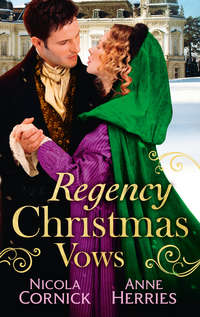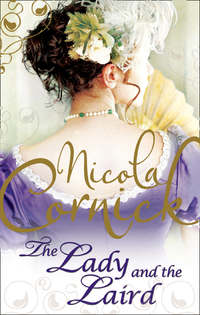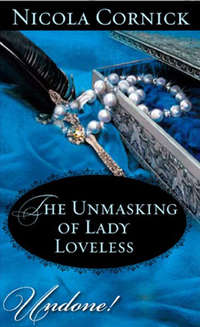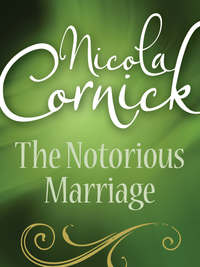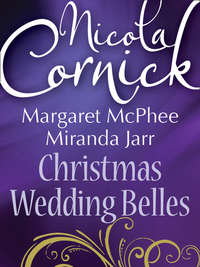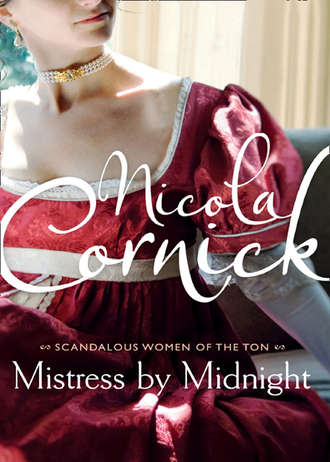
Полная версия
Mistress by Midnight
When he had found his midnight bibliophile, Garrick thought, he was going discover exactly what her business was with him. And this time he would not let her run away.
“THANK YOU FOR YOUR CUSTOM, Lord Selfridge. It was a pleasure to be able to provide you with the information you required.”
Merryn sat in a dark corner of the waiting room while her associate, Tom Bradshaw, ushered the peer toward the stairs. Selfridge barely noticed her and certainly did not recognize her. Merryn would have been astonished if he had. In her daily life, as the frightfully studious bluestocking sister of Joanna, Lady Grant, celebrated ton hostess, she was practically invisible. She seldom attended the high society events that both her sisters loved and when she did she hardly ever danced. Those people who took the trouble to engage her in conversation usually regretted it because she was only interested in erudite subjects and chose to have no small talk. Most young men were afraid of her, bored by her, or both. She was known as the Simple Ton by those society fashionables who deplored her bookishness and her lack of social graces.
Such insignificance made it far easier for her to live as she wished, pursuing an interest in all manner of scholarly activities on the one hand and working for Tom on the other. If her sisters had known that she worked for a living they would probably have had the vapors. If they had known she was employed by an inquiry agent the strongest smelling salts would not have been able to revive them. And if they discoverd that sometimes she stayed out at night to do her work and invented fictitious friends to cover for her … But then, Merryn thought, they never would find out. They would not guess because such thoughts were unthinkable.
Except … except that she had made a mistake last night. It was the sort of mistake that could lead to the unmasking of what she liked to think of as her secret life. She had committed the cardinal sin of being caught, and by Garrick Farne, of all people. If there was one time that she should have been particularly careful, it was when she was working against the man who had killed her brother and ruined her family. But it was too late now. Farne had seen her. Farne had kissed her. A little of ripple of disquiet, mixed with something more deep and disturbing, edged down her spine.
“Are you coming in or are we to talk out here?”
Tom was holding his office door open for her, his head tilted inquiringly to one side, eyes bright, a smile curling his lips. He was cocky, but Merryn liked him for it. Tom, the son of a stevedore who had worked on the Thames loading ships, still kept his offices within a stone’s throw of the river. He was one of the most successful inquiry agents in London, finding everything from missing heirs to servants who had absconded with the family silver. She had worked alongside him for the past two years.
Merryn uncurled herself from her seat and preceded Tom into the office. There was a chair but she knew from experience that it was uncomfortable so she remained standing. Tom propped himself against the edge of his desk.
“So did you find any papers relating to the duel?” Tom said. “Any servants paid off around that time, any proof of a cover-up, anything suspicious at all?”
“I’m very well, thank you, Tom,” Merryn said tartly. “How are you?”
Tom grinned, his teeth a flash of white in his face. “You know I have no manners.”
“Clearly,” Merryn said. She looked at him. No one would mistake Tom Bradshaw for anything other than what he was: the self-made son of a working man. The well-cut clothes could not conceal his innate toughness.
“No,” she said. She turned her face away. “I didn’t find anything.”
Three weeks previously Tom had come to her with some information that he had said he thought would interest her and when she had read it the shock and outrage had gripped Merryn like a vise. Tom’s information had been a tiny entry from an obscure local Dorset newspaper. He said that he had found it quite by accident when he had been working on a different case. The paper was twelve years old and there, between references to pig rustling and theft at a country fair, had been the report of an inquest into the death of Stephen Fenner.
Merryn could remember the piece word for word. She thought she would never forget it.
“The coroner at the inquest into the death of Stephen, Viscount Fenner, reported that there had been two bullets in the victim’s body, one in the shoulder and one in the back …” And then, farther down the page: “Daniel Scrope, gamekeeper on the Starcross estate, reported hearing an altercation followed by the firing of three shots …”
Merryn shook a little now as she remembered how she had frozen where she had sat, her gaze riveted to the tiny shred of news that contradicted all the official reports of her brother’s death. Before he had fled the country to escape the exigencies of the law, Garrick Farne had left a statement giving details of the duel. He had sworn that it had occurred over the elopement of his best friend, Stephen Fenner, with Kitty, Garrick’s wife of only a month. Two shots had been fired, Farne had maintained, one by Stephen, who had missed, and the other by himself, which had proved fatal. The doctor and the two men’s seconds had supported his statement. Farne’s second had even claimed that Fenner had fired early, an unforgivable piece of cowardice further blackening Stephen’s name.
The case had never gone to trial and public opinion had been very sympathetic to Garrick Farne. He and Kitty had been married for barely a month. Stephen Fenner had clearly played his best friend false, seducing Garrick’s wife, trying to entice her to run off with him and compounding his deceit by attempting to kill Garrick by firing before the flag was dropped. Besides, a duel was an affair of honor and society understood the rules that governed such cases. Garrick Farne was generally felt to have acted regrettably but understandably.
That had been appalling enough to Merryn, unforgivable, heinous, but when she had discovered that there had been three shots and two bullets in Stephen’s body, she had been consumed with grief and anger. Garrick Farne had lied, there had been no duel, only an execution, and he should have hanged for murder. She had hated Garrick before, hated what he had done, despaired over the way his actions had wrought such unhappiness and ruin on her family. Now, though, her anger was transformed. If the truth had been buried she would dig it out. She would show the world that Garrick was a liar and a criminal, and she would strip him of all honor and respect. She would find the proof that would mean his life was forfeit.
Merryn had searched like a woman possessed to find any other evidence such as the original inquest report, the findings of the doctor who had conducted it, the original witness statements of the seconds who had allegedly been present at what she now suspected was a fictitious duel. She had drawn a blank. All papers were lost. All witnesses had vanished. Merryn had been disillusioned but hardly surprised. She knew that the Dukes of Farne were rich enough and powerful enough to pay their way out of such a scandal. But she could not give up now. If there were the slightest chance that she could prove that Garrick Farne had killed her brother in cold blood then she would expose him. She wanted him to lose everything that had been built on his lie. She had lost so much when Garrick had killed Stephen. She wanted him to understand how that felt.
“You found nothing,” Tom repeated. He was looking annoyed, so irritated, in fact, that Merryn wondered if he might secretly have a client interested in her findings. It seemed unlikely but not impossible.
“You did search everywhere?” Tom persisted.
Merryn frowned. “Of course I searched everywhere. I’m not an amateur. I looked in the study, the library, the bedrooms—”
“In the bedrooms?” Tom said.
“I thought there might be papers concealed in a book,” Merryn said.
Tom gave her a quizzical look. “I repeat, in the bedrooms?”
“People read in bed,” Merryn said, a shade defensively.
“Do they?” Tom seemed surprised. “I don’t. I have more exciting things to do.”
Merryn rolled her eyes. “You and Garrick Farne both.”
Tom raised his brows. “What?”
“I was under the bed,” Merryn said, “when the Duke had a visitor. A voluptuous and eager lady called Harriet.”
Tom pursed his lips on a soundless whistle. “Harriet Knight, his late father’s ward?”
“I have no idea,” Merryn said tartly. There was a squirm of something in her belly that felt disconcertingly like … jealousy? “They were obviously beyond needing surnames,” she added.
“Poor you,” Tom said. “There’s nothing worse than voyeurism.”
“I’ll take your word for it,” Merryn said. “Fortunately he threw her out before things became too embarrassing for me.”
Tom started to laugh. “Farne threw an eager seductress out of his bedchamber?” he said. “He really has changed. I assume you were able to get away when he fell asleep?”
“No,” Merryn said. She hesitated. It probably was not wise to tell Tom of her encounter with Garrick Farne. He would be furious because she had compromised not only her own safety but also his business. If Garrick were to discover her identity somehow and start asking questions he would discover that she worked for Tom and a powerful enemy like the Duke of Farne would be very dangerous for Tom’s livelihood. Besides, she was not sure she wished to relive the encounter. The unexpected affinity she had felt for Garrick, the pleasure of their quick-fire conversation, the sweetness that had ambushed her when his lips had touched hers in that infinitely tender caress … She had not expected to feel any of those emotions. She should not.
Tom was watching her. He was quick; he’d seen her hesitation.
“Well?” he said.
“Unfortunately I sneezed,” Merryn said, “and he dragged me out from under the bed.”
Tom’s reaction was predictable. There was a moment of silence and then he exploded. “Bloody hell, Merryn—”
“I know,” Merryn said hastily. “But I didn’t tell him who I was, or what I was doing there. You don’t need to worry. He doesn’t know I work for you. No one does.”
Tom clenched his fists. “Merryn,” he said, “the work you do is supposed to be secret. The clue is in the word.”
“Of course,” Merryn said quickly. “Sorry—”
Tom made a visible effort to get himself under control. He rubbed his forehead. “I warned you it was dangerous to go there,” he said. “I told you to be careful.”
“I was,” Merryn said defensively. “It was just bad luck.”
Tom gave a sigh. “Well, you have not been hauled up in Bow Street so evidently you got away,” he said. His tone had eased a little. He even managed to give her a half smile. “Did you kick him in the balls and run away?”
“Something of the sort,” Merryn said. She wondered how she had managed to retain any shred of innocence associating with Tom Bradshaw. Her vocabulary had certainly been broadened, if nothing else.
Merryn had never been quite sure how she and Tom had come to be as close as brother and sister. She had first met him three years before when he had broken into a house where she was staying. She had found him rifling through her host’s study and had held him at sword point—there had been a medieval claymore on the wall—until he had revealed to her that the purpose of his illicit visit was to reunite the government with some very sensitive papers pertaining to the war. She had been frankly intrigued by Bradshaw’s business and had thought it would be the perfect line of work to get into. She had a passion for justice, too little money, too much time and nothing to do that remotely interested her. Being a debutante was a tedious business; all the men she met wanted blandness in a woman, a pattern-card wife. Merryn, in contrast, did not want a man at all. She had never met one she preferred to her favorite books.
Tom had laughed at first when she had sought him out at his office and proposed that she work for him. Then he had remembered the claymore. And she had pointed out that she had the entrée into houses that he had to burgle. She could attend balls and routs, speak to people that he could not approach. They had been a partnership ever since.
Tom walked across to a side table that held a dusty crystal decanter and matching glasses. He gestured to them. Merryn shook her head. She was never quite sure what was in Tom’s decanter and suspected that it was villainously bad sherry. Tom poured for himself, took a mouthful and then looked back at her.
“It might be better if you drop this whole matter,” he said abruptly. “When I first found the reference I thought that you had a right to know the truth but now—” He shrugged uncomfortably. “I think it could get us all into trouble.”
“No!” Merryn said. She felt panicked. “It was an accident, Tom. I promise to be more discreet in the future.”
Tom did not answer for a moment. He sat down, placed his glass gently on the desk and leaned forward. “I think your determination to find out the truth leads you to take risks we cannot afford because you are obsessed with exposing Garrick Farne,” he said. “It is not only dangerous.” He took a breath. “It is unhealthy, Merryn. You should let it go.”
Merryn wrapped her arms about herself. She felt chilled and her stomach lurched a little with sickness. She always felt like that when she thought about her brother Stephen and the fate Garrick Farne had meted out to him. The scandalous shadow had dogged her steps for over a decade. She had been thirteen when Stephen had died and it had felt as though the sun had gone out. Everything had changed, every keepsake of Stephen lost when the estate was sold, every link with him wiped out. Stephen had blazed across her life like a wayward star and when Garrick Farne had extinguished that light her whole life had been plunged into darkness. The grief had been like a punch, leaving her stunned with the force of the blow.
“It’s not just about Stephen’s death,” she said. She rested a hand against the window glass. It felt cold beneath her fingers. Down in the alleyway below, two ragged children were playing with a hoop. “We lost our father as well, and our home. We had nothing left. Papa went into a decline and died because he was so broken to have lost his heir.”
“Then he should have valued his daughters more,” Tom said grimly. “He was a fortunate man to have other children, yet he did not appreciate it.” He looked at her. “I do wonder, though,” he added, “if your recollection of that time is quite accurate, Merryn. You were only a child—”
“I was thirteen,” Merryn said. Her stomach did a giddy little swoop. “Old enough to remember everything.”
She turned away so that Tom could not see her face. She had known exactly what had been going on between her brother and the newly wed Kitty Farne because she was the one who had carried their clandestine messages. She was the one who had led Stephen to his death. The old guilt stirred and she shuddered sharply, slamming the door to block out the memories and the pain. It was not her fault. She had never intended it to end in murder. She had to remember that she was not the one who had pulled the trigger and taken Stephen’s life.
“You sound guilty,” Tom said, frowning at her. “Why on earth—”
“Spare me your analysis,” Merryn snapped, angry that he had been acute enough to pick up on her feelings. “I don’t feel any guilt. Why should I? Farne was the one who killed Stephen. And if he did that in cold blood rather than in a duel then he has even less honor than I had thought and he deserves everyone to know it. This isn’t just about revenge, Tom. It’s about justice …” She stopped, gasping for breath.
There was a silence in the little room. “I’m sorry,” Tom said. “I accept that Garrick Farne’s actions were far-reaching.” There was a note of impatience in his voice now. He pushed his chair back from the desk. “But I still think your feelings affect your judgment, Merryn.” He gave a quick shake of the head. “I don’t know … I suppose that I cannot stop you pursuing Farne if you choose since it is not an official case.”
“No,” Merryn said, “it is not. But I think that you have an interest in it all the same. I’ve thought so from the beginning.”
Tom looked startled. “Why do you say that?”
“Because I know you,” Merryn said. “Don’t prevaricate with me, Tom. Is there a client?”
Tom stared at her for a moment and then shook his head. “I cannot tell you anything,” he said. “Client confidentiality—”
Merryn made an exasperated sound. “Tom!”
“Oh, very well,” Tom said. He moved the files around on his desk. “There is someone who is interested,” he said. “One of Farne’s brothers. There is no love lost there.”
“One of Garrick Farne’s brothers wants to see him hanged?” Merryn pressed. She had known that Garrick was estranged from most of his family but still she was shocked. “Why on earth …”
Tom shrugged. “I don’t ask questions like that. I simply take the money. But you see …” He paused, looked at her. “That is another reason why we cannot afford for Farne to know.”
“I understand,” Merryn said.
Tom ran a hand through his hair. “It is a pity that Farne saw you. He may start asking awkward questions. And he’s a dangerous man to cross. He worked for the War Office for years when he was in exile.”
“As a translator,” Merryn said dismissively. “It’s hardly the front line.”
“It is when you are translating between the British and the Spanish guerrillas,” Tom said dryly. “One might as well live on a powder keg. Farne was, and still is, a famed swordsman, a crack shot—” He stopped. “Sorry, that was tactless of me.” He opened a drawer in his desk and took out a file.
“I have found out a little more information,” he said. “I checked out the seconds at the so-called duel. Farne’s second was a man called Gabriel Finch. He went to Australia as a curate. And your brother’s second was Chuffy Wallington and we all know what happened to him.”
“He drank himself to death,” Merryn said. “I remember Chuffy. He was a frightful soak.”
“Easily bought off, I expect,” Tom said. “As for the doctor, he is locked up in the Fleet prison for debt. I might well pay him a discreet visit.”
“I’ll go,” Merryn said. “He will be more likely to talk to me.”
“Possibly not,” Tom said, “when he knows who you are.” He closed the file softly. “I have to admit,” he said, “that it looks very bad for Farne. Three shots, two bullets, one in the back … Reports suppressed and rewritten, witnesses disappearing, no doubt paid off … And he runs away abroad and then his father fixes it all with the authorities so that he never has to stand trial and can come home a decade later with everything forgiven and forgotten …” Tom shook his head. He paused. “Perhaps we should reconsider. We’re stirring up a lot of trouble. All this was buried years ago. People won’t like it.”
Merryn shivered. A little ripple of anticipation mingled with apprehension fluttered down her spine.
“I’m not giving up now,” she said. “I want to know the truth and I want Farne to face justice. But if he finds out …”
If Farne finds out there will be hell to pay …
She remembered the ruthlessness she had sensed in Garrick Farne the moment she saw him. Tom had been right: he was no ineffectual scholar, he was a man with a dangerous past.
Tom was watching her face.
“You had better make sure he does not find out,” he said, “but if you are too scared to do it—”
His tone was all the incentive Merryn needed.
“No,” she said. “No, I will do it. It will be my pleasure.”
CHAPTER THREE
“I HAVE FOUND YOU an inquiry agent, your grace, Hammond by name.” Pointer, his nose twitching in a manner that indicated that he could not quite believe how low he had stooped, stood back to allow the ingress of a man into the library at Farne House. The late autumn evening was already drawing in, darkness dropping over the streets of London and creeping into the room. Garrick had forced himself to work for another four hours on the Farne estate papers, acquainting himself with all the dependents on the Dukedom, all the pensions to be paid, the widows and orphans, the servants, estate workers, the whole panoply of his fiefdom. It was terrifying how many people depended upon him.
Despite the presence of a full branch of candles the room looked gloomy and bare, the bookshelves standing like sentinels. Garrick stood up and stretched, only now aware of how stiff he had become poring over the books for hours on end. He shook the newcomer by the hand and gestured him to a chair. The long mirror that stretched along one wall reflected back their images. It was easy to see why Pointer disapproved, Garrick thought. In the butler’s eyes the visitor would be categorized as most definitely not a gentleman. There was about him an indefinable air of seediness. It seemed soaked into his person, from the battered hat he held in his hand to the world-weary expression in his deep-set gray eyes to the cut of his clothes. He was the type of man Garrick had met on many occasions in his work in the Peninsular—the fixer, the intelligence man, for sale to the highest bidder, exactly the man Garrick needed now.
“Mr. Hammond,” he said. “How do you do?”
“Your grace.” The man did not bow. It was more a meeting of equals, Garrick thought. He needed a service Hammond could provide and the inquiry agent saw no need to be deferential.
“A drink?” Garrick offered. “Brandy?”
“Not on duty, thank you, your grace.”
That, Garrick thought, argued a certain discipline. He nodded. “You will excuse me if I do?”
Hammond’s smile indicated that he recognized this was merely a courtesy. He sat in one of the large wing chairs before the fire, his hat on his knee, politely waiting for Garrick to state his business. Garrick poured for himself—no sense in summoning Pointer simply to perform that function, although no doubt the butler would feel he should have preserved the formalities—and took the chair opposite, crossing one ankle over the other. Mr. Hammond raised an interrogative brow. Garrick paused, chose his words with care.
“I need you to find a lady for me, Mr. Hammond.”
Hammond snapped open a notebook with such alacrity Garrick jumped.
“Is she lost, your grace?”
“No,” Garrick said. “What I should have said is that I need you to identify a lady for me.”
“Ah,” Hammond said. “Semantics.”
“Quite,” Garrick said, warming to him. “There is a lady I have met, I do not know her name and I want you to find her and tell me who she is.”
Hammond nodded. “Description?”
“Small, fair-haired, blue-eyed …” Garrick struggled. A pocket goddess, beautifully rounded, soft, smooth skin, vivid blue eyes, hair like a tumble of golden corn …
Get a grip on yourself, he ordered himself.
“Age?” Hammond’s sharp gray gaze was unblinking.
“Twenty-five,” Garrick said, “or so she told me.”
Hammond nodded. “And you met …”
“Here,” Garrick said. “She broke into my house last night. Or rather,” he corrected himself, “I believe she might have been staying here for a little time.”
“Lady Merryn Fenner,” Hammond said.
Garrick blinked. “I beg your pardon?”
“Lady Merryn Fenner,” the inquiry agent repeated. “Sister to Joanna, Lady Grant, and Teresa, Lady Darent, and daughter of the late Earl of Fenner. Your grace.”
Lady Merryn Fenner.
Garrick felt as though someone had emptied a bucket of ice down his back. The woman he lusted for, the wraith who haunted his thoughts, was Stephen Fenner’s youngest sister. In a flash he remembered the initials in the copy of Mansfield Park, the entwined M and F. He remembered her eyes and saw the vivid blue of Stephen’s.
“How the devil,” he said slowly, “did you know? There must be a hundred small, fair, twenty-five-year-old ladies in London. Two hundred. A thousand.”




